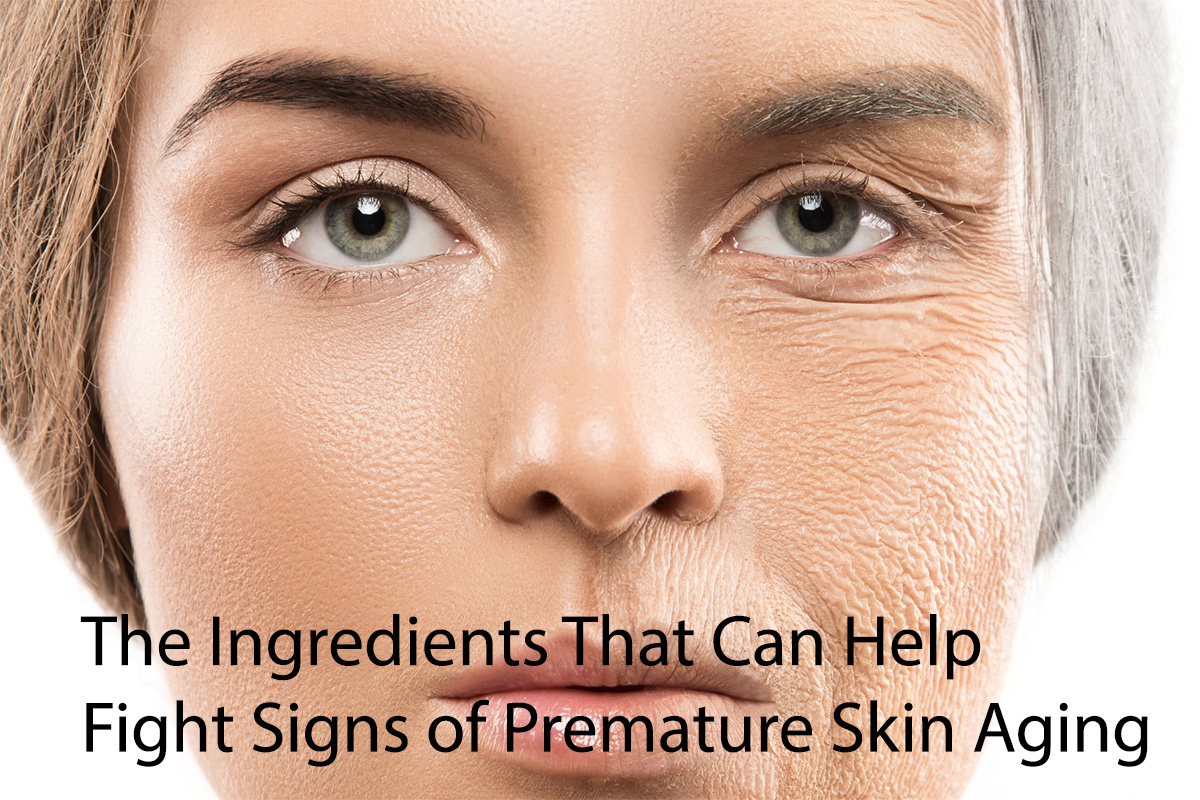If you are looking for a product that can effectively fight skin aging, there are several ingredients you should look for. The most effective creams will contain ingredients such as Vitamin C, ceramides, Aloe vera, Retinol, and Ceramides. The ingredients in these products have been proven to help prevent the signs of premature skin aging.
Vitamin C
You may have heard of vitamin C but do not know its role in fighting the signs of aging skin. While it may seem contradictory to think that vitamin C can help fight premature skin aging, this powerful antioxidant has many uses in the body, including fighting oxidative stress and boosting the immune system. It may also help lighten the dark circles under the eyes and liver spots. The good news is that vitamin C is found in many foods, and you can also get it from supplements. However, it is important to remember that too much vitamin C can have unwanted side effects.
Aside from helping fight the signs of premature skin aging, vitamin C can also fight the effects of free radicals. This antioxidant helps protect the skin from the harmful effects of ultraviolet rays, which can cause skin discoloration. However, it does not have the same effect on dark pigmentation. It does not fade the marks, but it can help fade brown spots and prevent them from appearing. This antioxidant is beneficial for those with sun-damaged skin, as it improves hydration, elasticity and roughness.
The positive relationship between the amount of fruit and vegetable consumption and skin health is well established. Fruit and vegetable intake and vitamin C status are closely associated. Studies have shown that vitamin C has a significant impact on skin aging. Although the exact effects of vitamin C on skin are difficult to measure, some studies use objective measurements such as wrinkle depth and collagen deposition. Nonetheless, vitamin C helps the skin heal wounds and prevent raised scars.
Ceramides
The protective layer of lipids in our skin is a delicate layer of fatty acids. As we age, this barrier weakens and skin becomes dehydrated. Ceramides can help reinforce this barrier and restore skin hydration. This ingredient is suitable for all skin types and levels of sensitivity. Read on to learn more about this nutrient. But what is ceramides?
Ceramides are a key lipid found in the stratum corneum of the skin, the outer layer of the epidermis. They form a protective layer that holds skin cells together and minimizes visible damage caused by stress. A Dutch study found that ceramide levels decreased drastically from summer to winter. This is a clear indication that ceramides can help combat the signs of premature skin aging.
Ceramides are an essential ingredient in anti-aging skincare. Their role is to protect the skin from environmental factors that cause skin aging. Vitamin C is a good example. It supports collagen synthesis, slows oxidative damage, and even works with sunscreen. As the antioxidant in skin care products, it provides extra protection against UV damage. In addition to promoting collagen formation, vitamin C also helps to maintain a youthful appearance.
Although ceramides are a crucial part of the skin’s protective barrier, they are often overlooked in skincare products. Ceramides are fatty acids found naturally in the skin’s uppermost layers. They are crucial to skin health because they help seal the skin barrier, protect the deeper layers from dehydration, and promote healthy hydration. However, when the skin becomes overly dry, it becomes prone to cracking and wrinkling.
Aloe vera
One way to keep skin young is to increase the amount of antioxidants in the skin. Antioxidants prevent the production of free radicals that damage proteins and cell structure. Aloe vera is high in antioxidants and has powerful anti-inflammatory properties. Aloe vera is rich in vitamins B1, B2, B6, B12, C and E. They promote wound healing and prevent skin wrinkling.
In addition to its antioxidant and anti-inflammatory properties, aloe vera is also an effective moisturizer. Despite its noncomedogenic nature, it penetrates deep into the skin and provides moisture. It is also effective for healing dry and rough skin. Moreover, it can fight signs of aging and improve skin elasticity. Moreover, drinking aloe vera regularly is also effective in improving skin texture.
The healing effects of aloe have been reported in animals and humans. In rats, aloe gel significantly increased collagen production and increased oxygen delivery to tissues. This healing was associated with increased hyaluronic acid and dermatan sulfate levels. These studies also showed that aloe gel stimulated collagen synthesis and fibroblast activity. The effects were similar in humans.
Studies have also shown that aloe vera can reduce facial wrinkles. In fact, a small study in Korea has shown that aloe can help fight signs of premature skin aging. It also has antioxidant properties that have been linked to a reduction in inflammatory markers. Further research is needed to prove this claim, but for now, aloe is an excellent solution for skin care.
Retinol
Retinol helps protect collagen and improves overall appearance. It works by stimulating cell turnover and collagen production. Retinol has also been shown to reduce the passive evaporation of water from the skin. Researchers are currently examining the benefits of retinol in combination with other agents to fight skin aging. For this reason, it is a good candidate for combination therapy.
Retinol naturally occurs in the skin and can be found in our bodies as retinyl esters. In our bodies, we convert retinol to retinyl esters before it enters the bloodstream. Retinol is then stored in our liver where it is metabolized by plasma-retinol-binding proteins. Retinol is converted into four other important products known as retinoids: retinol acetate, retinoic acid, and retinyl-coenzyme A. The liver converts retinol into four metabolites: retinyl-coenzyme A, retinyl-ester-hydrate, and retinol-ester-hydro
A topical retinol can provide plumper skin and reduce the appearance of fine lines and wrinkles. One study showed that 0.4% retinol helped increase epidermal thickness and increased blood flow, as well as improved collagen and elastin expression. This may be due to retinol’s effect on the microenvironment of the dermis.
Coenzyme Q10
Coenzyme Q10 is a highly effective antioxidant that is required for energy production in the cells of the body. While the sun still presents a threat to our skin, the effects of pollution and smoking can also result in oxidative stress. In the body, this results in skin cells that are less able to regenerate, repair, and protect themselves from damage. The resulting aging skin loses firmness, radiance, and becomes more prone to fine lines and wrinkles.
Besides preventing skin aging, CoQ10 also helps prevent hyperpigmentation and dark spots. This compound inhibits the tyrosinase enzyme, which is responsible for producing melanin. Thus, it helps promote an even skin tone. In addition, it helps fight inflammation by reducing the effects of UV radiation. It is important to note that the production of CoQ10 declines with age.
Although Coenzyme Q10 is produced naturally by the body, its levels gradually decrease as we age. Fortunately, our body can replenish its supply of CoQ10 by eating foods rich in fatty acids. Unfortunately, this is not always possible, and so it’s more convenient to take a supplement. The following information is based on research done by researchers at the University of California at Berkeley.
Green tea
Drinking green tea can slow the aging process. However, some people believe that the beverage can even cure cancer. But green tea isn’t just good for you: it’s also an excellent face mask, which can revitalize your skin and help you get rid of acne or blemishes. Here’s how you can use green tea on your face. Try it out for yourself!
One of the benefits of green tea is its antioxidant content. EGCG, or epigallocatechin-3-gallate, is a powerful antioxidant that helps repair DNA damage caused by UV rays. Furthermore, EGCG can protect your skin from nonmelanoma skin cancer. Green tea contains polyphenols (a compound called catechins), which are anti-inflammatory and have anti-aging properties.
Another way green tea can improve your skin is by helping control your skin’s excess sebum production. This way, you can avoid the appearance of blackheads and pimples. Additionally, green tea can help you avoid the formation of acne by unclogging your pores. It’s also a great natural anti-sunscreen. To see how green tea can improve your skin’s health, start drinking a cup of green tea today!
Green tea also has antioxidants called catechins, which fight free radicals. These antioxidants can help the body repair damaged DNA and fight against skin cancer. Green tea also has anti-inflammatory properties, as it fights free radicals, which are known to cause wrinkles and aging of the skin. And EGCG is a powerful antioxidant that fights against free radicals. It also has antibacterial properties, killing systemic inflammation and can help the body fight skin infections.
People also read :
- The Habits That May Contribute to Premature Skin Aging
- The Fascinating Facts You Probably Never Knew About Your Skin

